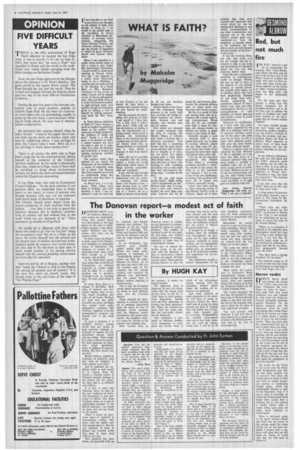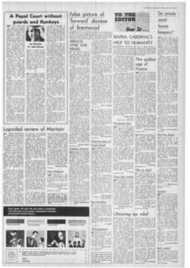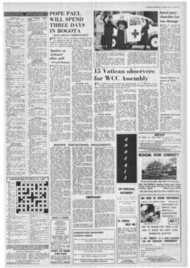Page 4, 21st June 1968
Page 4

Report an error
Noticed an error on this page?If you've noticed an error in this article please click here to report it.
Tags
Share
Related articles
Brentwood Founds Diocesan A.c.t.u.
An Important Post For Jack Donovan
Fr. Donovan (brother Of Wild Bill Donovan) Tells Us About...
1catholic Profiles: 23
Union Power And Human Relations In Industry
The Donovan report —a modest act of faith in the worker
By HUGH KAY
D ISAPPOINTMENT over the Donovan Report on trade unions was predictable. Those who wanted blood have been denied it. No legal fetters on the right to strike. Others wanted a new philosophy. Donovan was concerned with what can be made to work, On both counts the Report is adult, even if the Commission members are somewhat unsure of themselves. The tendency to scream for a policeman every time a problem stumps us is both neurotic and juvenile.
As Dr, McCarthy's survey learn made clear to the Royal Commission. an enforced reduction in strikes might well be offset by a corresponding rise in go-slows. working-to-rule or overtime bans. So what good would it do'?
In many firms there is a climate of flexibility. Both sides of industry are constantly finding ways of getting round procedure and rules of all kinds. Workers are paid over the odds; stewards are given privileges they cannot claim under agreements; questions like overtime. supposed to be the management's preserve, are handed over to the work group.
In such a situation it is doubtful whether anyone would take any notice of legal sanctions suddenly introduced to support the few procedural clauses which rule out strikes. There might be a ease, as Donovan grants, for legal sanctions on minorities which persistently strike in defiance of majority feeling. But how would you test this'?
Would workers, steeped in traditions of solidarity. give that kind of evidence in court against each other?
And to condemn the unofficial strike as such would be to remove from the
worker a freedom which, in Christian thought, belongs to the person, not the group: the right, that is, to withhold
It is easy to sneer that Donovan bases its case on the very traditions of industrial bargaining it was supposed to reform. But those traditions hinge on a type of relationship endemic to the British character. Lay hands on them, and you lay hands on the nation, There is today an enormous mass of goodwill in management worker relations; only the public isn't told enough about it. But the vast majority of firms in Britain are virtually strike free—most of them since 1926 at any rate.
This goodwill has been slowly and painfully built up by informal and flexible methods and attitudes. The intrusion of the law would destroy it overnight. The Prices and Incomes Bills put men on the defensive; and up went the wage demands like a rocket.
in our Parliament, conventions carry possibly greater weight than law. Within the union ranks, authority is expressed in "leadership by consent." Our unions can fight the establishment for justice, yet on the same day work with it in the national need. In few countries has the average working man acquired the influence over government that the unions have in Britain without resorting to the barricades.
This is why the European unions spend enormous sums on drives to back Britain's entry into the Common Market.
These channels for participation in national decision are of immense importance from the point of view of Christian social teaching. And the Donovan recommendations will extend enormously the shopfloor worker's scope for sharing in the industry that employs him.
Most workers here, as Donovan seems to realise, are not interested in workers' control by means of workerdirectors. The conflict of By and large, too, workers expect managers to manage, especially in these days of technological change.
The sort of control the worker wants, in his relations with the directors. is that of constructive tension between two equals: the boss and the union, There need be nothing divisive in this. On the contrary, it makes for mutual respect.
The important thing in Donovan, for me, is its recognition that the unions have already done its job for it. Their share in local productivity bargaining, starting with the Esso agreement at Fawley, has been statesmanlike. Often, the initiative has come from the union side: like the anti-strike charter for the shipyards.
Now machinery is proposed to lubricate productivity bargaining in every plant and factory where it will help. This will lay on the shop steward' and the men around him whom he represents an enormous responsibility: the fulfilment of much that the author of Rerum Novarum hoped for.
A worker ts no longer a hireling when his relations with management are governed, not by rigid national bargains unrelated to local realities. but by negotiations demanding—even of the unskilled man—an understanding of the production process and suggestions for its improvement. The implications require a radical reassessment of the whole of our educational system, starting with the secondary modern school where the workers of tomorrow are produced.
And every institute of adult education in the country will have to swing its resources behind the mammoth task of giving the shop steward the kind of training that will enable him to bargain from strength and know ledge. Responsibility for training programmes must rest in very large measure, too, with the unions, whose task it will be to fit their shopfloor representatives for local autonomous initiative in conjunction with union officials.
Meanwhile, the nation must try to get rid of its antiunion prejudice, fed by distorted reporting. One research team after another over the past few years has found that most managers are content with the way things are in their plants.
This came out clearly in
the McCarthy team's report
to the Commission. Where trouble does occur, it has little to do with subversion, as the Cambridge team's book on the motor car firms revealed last year.
What makes the worker
mad is frustration. Weak
managements change work policies, disrupt the earnings system, leave men hanging about with nothing to do (see the Cameron Report on the London building sites).
The Tories disregard the fact that the number of man hours lost in Britain through strikes is less than the number lost by the common cold, and is lower by far than in most industrial countries.
You can quarrel with Donovan if you will. But it does amount to a modest act of faith in the British worker. And that is the way to encourage him.
blog comments powered by Disqus











